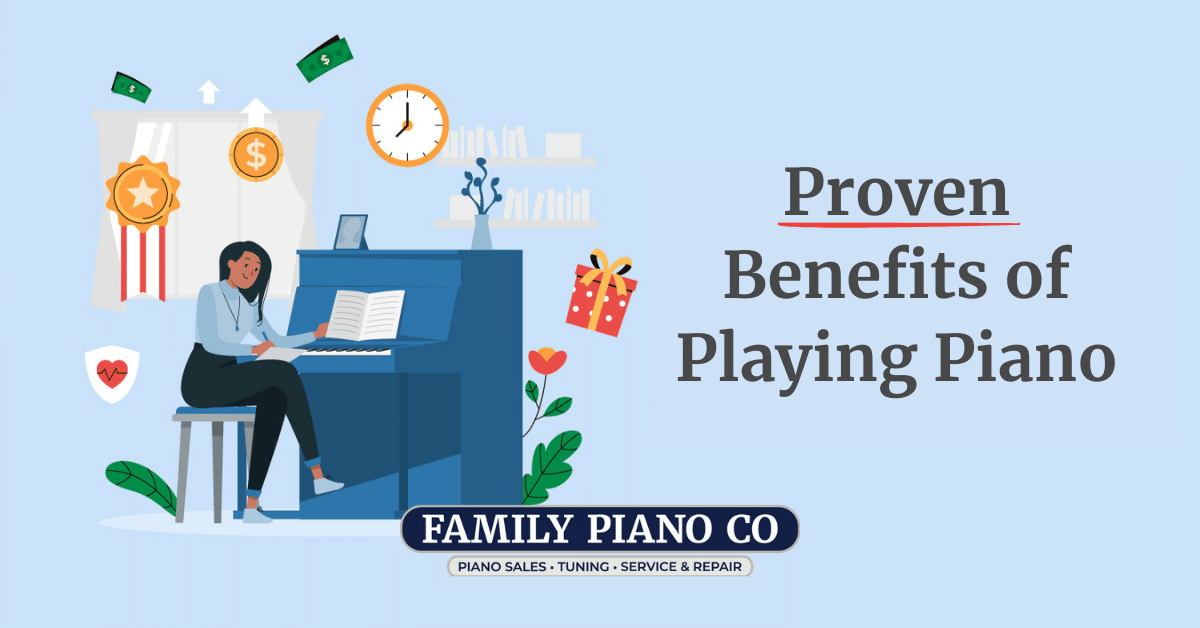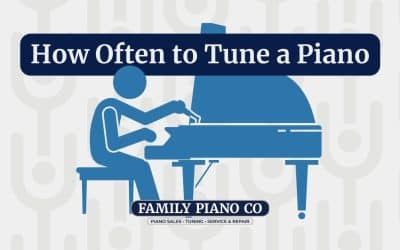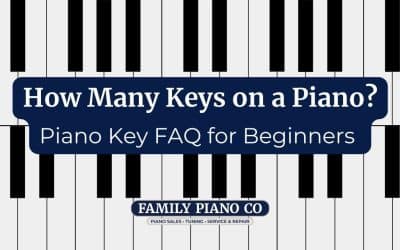No matter your age or musical ability, the benefits of playing piano are numerous. Learning to play piano is a rewarding experience that can bring anyone a lifetime of joy.
We think that most people vaguely know this is true, but you may not be aware of the specific ways in which it can improve your life.
In this blog post, we will explore a few major benefits that come with playing piano — and provide reputable sources for them too!
From improving cognitive skills to reducing stress and fostering social connections, piano has something to offer everyone no matter age or skill level!
There’s no way we could ever cover every benefit that comes with piano. So we do invite you to leave a comment with any additional benefits — even if just personal!
Boosts Early Brain Development
This is a huge one that we found little evidence against.
While exact details and causations are still being researched, it is generally agreed upon that taking music lessons as a child boosts brain development in a variety of ways.
Wondering if it’s too early (or late) for your kid to take lessons? Read our blog post: When Should My Child Start Piano?
Correlated with Higher IQ
In 2006, one study found that even after just a single year of musical training, children performed better on a test that was correlated with better literacy, memory, ability to do math, and a higher IQ (compared to a similar group of children who didn’t receive any music lessons).
This was a small group of kids focused on earlier development from ages 4-6, but there have been similar findings to support this claim in older children within larger groups as well.
(Source: First Evidence That Musical Training Affects Brain Development In Young Children)
Improved Brain Plasticity
Other studies have found significant development can happen even sooner than the ages of 4-6 too.
In the 2008, “Musical Training Influences Linguistic Abilities in 8-Year-Old Children: More Evidence for Brain Plasticity” study, just 6 months of musical training was enough to demonstrate improved brain plasticity, and that these “relatively short periods of training have strong consequences on the functional organization of the children’s brain.”
Higher Ability to Learn as Adults
Of course, smart children should then become smart adults. We were able to find two studies supporting the idea that taking music lessons as a kid promotes cognitive function into adulthood.
Specifically, there were many correlations with improved neuroplasticity and the ability to learn overall. (Sources: A Little Goes a Long Way: How the Adult Brain Is Shaped by Musical Training in Childhood ; Older Adults Benefit from Music Training Early in Life: Biological Evidence for Long-Term Training-Driven Plasticity)
The benefits of music are therefore long-lasting, and even if a child doesn’t take to piano forever, it definitely gives them lifelong advantages!
Fights Functional Decline in Older Adults
The benefits of music aren’t only limited to children though!
There is more and more research being done now on how piano specifically positively affects older adults.
Generally, it’s being shown that older adults who practice piano regularly could be fighting off cognitive and functional decline as a result.
We know we say this all the time, but no: you’re never too old to start playing piano!
Sharpens Attention and Motor Ability
One study found that a group of such pianists showed a significant improvement on the Stroop test, which measures executive function, inhibitory control, and attention. A trend in the enhancement of visual scanning and motor ability was also found. (Source: Effects of music learning and piano practice on cognitive function, mood and quality of life in older adults)
Aids Age-Related Cognitive Decline
Another study published in the “Aging & Mental Health” journal additionally found that older adults who took piano lessons saw significantly improved performance on the Trail Making and Digit Symbol Tests.
These are two neuropsychological exams that can help detective cognitive problems relating to brain damage, dementia and age.
So the findings suggest that piano lessons could serve as an effective treatment for age-related cognitive decline! (Source: Individualized Piano Instruction enhances executive functioning and working memory in older adults)
Benefits of Playing Piano for Older Adults Exist!
While there’s still a ton of research left to be done in this field, the findings that are discovered have been largely positive.
And they largely suggest that playing piano is linked to improvements in executive function in old age.
Improves Mood & Self-Esteem
Emotional benefits are admittedly hard to qualify empirically. Feelings are obviously subjective, and moods can easily be swayed which makes them harder to report on.
Still, it is commonly self-reported that playing piano helps people relax and eases stress. And there have been research efforts made that largely support similar findings!
Reduces Levels of Stress & Depression in Adults
On the whole, researches do find that people who play the piano tend to experience less anxiety and depression than their non-musical peers.
One study found that taking piano lessons decreased depression, induced positive mood states, and improved the psychological and physical quality of life in their group of older adults (Source: “Effects of music learning and piano practice on cognitive function, mood and quality of life in older adults“).
Another drew similar conclusions about reduced levels of depression, stress, and anxiety, and additionally saw improved audio-visual perception even beyond things related to music (Source: An RCT study showing few weeks of music lessons enhance audio-visual temporal processing).
Improves Self-Esteem in Children
Similar findings have also been reported in younger participants. A personal favorite report of mine, “Effects of Three Years of Piano Instruction on Children’s Academic Achievement, School Performance and Self-Esteem“, followed 117 4th graders in Montreal who 1) hadn’t taken music lessons before, 2) didn’t own a piano, and 3) came from households with annual incomes under ~$30,000.
They gave their experimental group a free piano and lessons for three years, and gave everyone tests for self-esteem and academic performance. It was then concluded that the group of children who took three years of piano lessons had a significantly stronger sense of self-esteem by the end.
Playing Music is Therapeutic Overall
It’s maybe worth mentioning that these benefits aren’t tied exclusively to playing piano or taking lessons though (even though we do highly recommend both those things).
There are therapeutic outcomes of just playing any instrument overall which include decreased anxiety and agitation, better communication skills, improved emotional expression. (Source: A Prescription for Music Lessons)
And it’s worth concluding on the fact that you don’t have to be good at piano to love piano or to be proud of yourself!
Findings from “The Benefits of Adult Piano Study as Self-Reported by Selected Adult Piano Students” showed that adult piano students placed the highest value on simply fulfilling their dreams of playing. This was the highest-rated of 31 different benefits between the 711 people surveyed — even above technical improvement and skill!
Helps Develop Empathy
Empathy is the ability to understand and share the feelings of another person.
We won’t enter the debate on if this skill is on the decline in our current fast-paced times. However, I think we can all agree that the world could always use more.
Empathy is a keystone skill. It leads to better communication, accountability, honesty, and better team-based skills overall. Through the process of making and playing music, pianists can improve this trait — and ultimately improve their relationships and communities.
Playing piano also eventually requires musicians to deeply consider their emotions, the emotions of the audience, and the emotions of the composer — a huge and constant exercise in complex thinking. This alone is thought to lead to a higher emotional intelligence. But there have been efforts to try and prove the claim empirically too.
Helps with Social Behavior & Lessens Aggression
One instance of research found that musical training is positively associated with increased levels of empathy and prosocial behaviors.
Perhaps equally as important, it’s also negatively associated with acts of aggression and behavioral issues. (Source: Musical Training in the Development of Empathy and Prosocial Behaviors)
Communicating Openly through Music
In a piano duet format, it’s important to have an instinctual understanding of the piece and other player. Most communication is conveyed without direct statements, and conflicts are resolved in a similar fashion.
We were able to find a particularly interesting article that observed the relationship between two players rehearsing a duet. They would write down their reflections after each of the 8 rehearsals, commenting on how their performance was developing. The concluding analysis of their entries highlights the importance and development of empathy in this setting.
Specifically, the ability to experiment without fear of judgement and make mistakes without fear of embarrassment was crucial in developing musical interpretations. Empathy thus plays a big role in enabling a safe space for players to express themselves freely. (Source: Empathy in Piano Duet Rehearsal and Performance)
6 More Benefits Pianists Agree Upon
As we’ve mentioned, there is a lot of research yet to be done in the field of music and its effects on the brain. So some things we can’t quite qualify with scientific backing (at least, not yet).
Still, ask any long-time pianist, and I’m sure they’d all agree that playing piano:
- Improves Concentration & Multitasking Abilities – To play the piano, one must learn to pay attention to multiple things at once: using both hands, reading music, listening to the notes, working the pedals keeping the rhythm, etc. This engages many parts of the brain at once, and it greatly improves your ability to focus and manage multiple tasks at once. In a world where everything is constantly begging for your attention, it’s becoming increasingly important to have this skill!
Science seems close to discovering how exactly this works. In fact, music therapy and piano playing is increasingly being pointed to as a potential treatment for ADHD!
- Develops Time Management Skills – As you work out your scales and songs, you learn to break down a larger project, like a song, into smaller goals, one measure and phrase at a time. As you practice, you perfect the art of time management as it relates to problem solving and scheduling tasks. Mastering this skill at the keyboard will equip you for better time management in other aspects of your life.
- Helps Improve Hand-Eye Coordination – You don’t have to be ambidextrous to play the piano, but playing will help you develop ambidexterity, the ability to use both hands equally well. When you play, your brain tells each hand to perform separate actions. Your right and left hands will play different notes at the same time, following different rhythms and moving in opposite directions. Mastering this ability can lead to improved reflexes, athleticism, and agility.
- Helps Develop Motor Skills & Hand Muscles – Another piano playing skill that you can benefit from is an increased level of fine motor skills. With time, your fingers will inevitably strengthen, control over your hands and fingers will increase, and coordinating fast and precise movements will become easier. For younger players, the opportunity to develop these skills is essential. For mature players, the piano offers an excellent opportunity to help strengthen and retain those fine motor skills too!
Note: while there is research on music training and motor skills — Martins et al., 2018; Tokya & Freund, 2006; Watson, 2006 — to our surprise, there wasn’t much we could find with specific regards to piano yet!
” The most intricately and perfectly coordinated of all voluntary movements in the animal kingdom are those of the human hand and fingers, and perhaps in no other human activity do memory, complex integration, and muscular coordination surpass the achievements of the skilled piants. ” – Homer W. Smith, From Fish to Philosopher.
- Trains Correct Posture – Learning proper posture at the piano can also help strengthen your back muscles and ultimately help prevent back pain. Just make sure you are indeed learning proper posture!
- Can Lead to a Better Social Life – We won’t say that playing the piano will inherently improve anyone’s social life. But it does give you the opportunity to play with others, for others and even teach others. Plus generally speaking, having it as a hobby will make you more interesting! Piano and music is something you’ll be able to talk about with others, and you could even find yourself in new music-related circles.
Benefits of Playing Piano: Being a Better You
So not only is piano a fun hobby, but it also has many proven cognitive and emotional benefits. As you learn and improve, you’ll develop a wide range of skills that will then benefit you in all areas of your life.
We’re excited to keep seeing research on music education develop. And we’re happy to know definitively that whether you’re an early beginner or very experienced, playing piano is well-documented as being a beneficial experience.
Of course, we know we’ve only covered a select few key benefits. The truth is that you could never explain every single benefit that music and piano have. Learning piano is a lifelong pursuit that will keep you challenged and engaged, and its rewards are endless.
Ready to play? Or need help with practicing better? Check out our Ultimate Guide on Practicing Piano!





I find it interesting that learning to play the piano could help improve a person’s mood and focus. My brother has been thinking about investing money in new activities. Perhaps visiting a store selling pianos and tuning services is a good idea.
Learning piano is definitely not a bad use of money or time! Especially if his brother is a tuner too. (: Thanks for reading, Zachary!
Thanks for mentioning that learning the piano can help develop motor skills and hand muscles. My daughter told me that she really wants to play the piano. I think that would be a great hobby for her to pick up, so I’ll look for a teacher for her this week.
Always a great hobby! Good luck finding a teacher! 😉
I want my daughter to learn how to play at least one musical instrument, so I was thinking of getting her private piano lessons soon since she also seems to be interested in it. It caught my attention when you told us that children who underwent musical training for even just a year have been shown to perform better on tests that correlate with better literacy, memory, mathematics, and a higher IQ since it helps boost early brain development. I’ll keep this in mind while I look for a music school nearby that can give my daughter the piano lessons she needs soon.
Fantastic article! Learning piano offers so many benefits, from boosting cognitive skills to relieving stress. It’s truly a wonderful instrument to learn and enjoy. Thank you for sharing